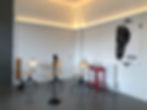Rest: Talking Birds' Nestival of Ideas
- Jaz
- May 20, 2024
- 4 min read
On Friday 17 May, I was very fortunate to be on the panel for Talking Birds’ Nestival of Ideas. Part of their Third Fridays programme, the Nestival of Ideas invites in 'interesting people' for 'interesting conversations' on a range of topics.
Friday’s topic was ‘Rest: Necessity, Resistance or Privilege?’
‘Panel discussion exploring the notion of Rest and Resistance, but also considering the complexity of choice (and who has, or is able to exercise it) in relation to rest.’
The panel was chaired by Janet Vaughan, Co-Artistic Director of Talking Birds. I was joined by performance artist & facilitator Sym Mendez and theatre-maker Samantha Holley-Horseman. The discussion proved very fruitful, so I thought I’d return to this blog to document some of the moments that stood out to me.

Sym framed rest as a collective pursuit quite early on in the discussion. Ultimately, it is plausible that collective trauma will require collective healing. A member of the audience added the intersection of ‘collective acceptance’, which really stood out to me. I’m not sure if I’ve seen it articulated succinctly like that before, but in a capitalist, neoliberal society, a lot of people feel like rest isn’t a real option available to them, or that rest must be earned. If as a community, we can begin to remove the stigma of resting in our own interpersonal relationships, we can begin to subvert the societal expectations of what Janet referenced as ‘grind culture’.
As much as life can feel like an independent pursuit, personhood is relational and actualisation happens in ecosystems. That being said, ‘me time’ can be invaluable in finding yourself and checking in with your body.
Sam approached the topic from a slightly different standpoint, looking at rest as neither radical, privileged, or a “necessity”. As a disabled theatre-maker in a competitive industry, is rest possible when one is constantly fighting for access and respect?
I had taken the standpoint that rest was a necessity: if you don’t choose to rest, your body will make you. But Sam asked how restful a ‘forced rest’ can truly be, when the rest has come about as a result of illness or chronic stress; when there’s still a ton of things that need to be done, and a world that won’t wait for you.
What is ‘rest’? What does it actually entail? Is it as simple as going to sleep or closing your eyes? What happens when ‘rest’ takes you away from what you love? From, what Sam calls your ‘glimmers’. What happens when ‘rest’ takes you away from your livelihood?
A man in the audience noticed this “forced rest” in his own line of work. But instead of it pertaining to chronic and physical illness, he saw how those unable to access employment experienced a version of this. If society functions on capitalism, and for whatever reason, you are unable to work, this unemployment forces you into a very precarious form of rest. The man mentioned that while waiting for work opportunities, individuals became apathetic and idle.
This can also be seen in patients during long stays in hospital beds. We pondered on how much the state contributes to the structural production of apathy in society – through shoddy infrastructure for disabled people; a lack of accessible activity for the unemployed; and the systemic, depersonalised treatment of vulnerable people. Here, activity is proposed as a form of rest.
Could we benefit from a criteria for rest? A woman in the audience said that dancing to 90s rave music was an act of rest for her. For Sym it was going on walks. For Sam, it was playing with Legos. For myself, a lot of the time it is time in isolation. Different strokes, different folks? Would we benefit from a combination of individual and collective practices for rest?
What if we saw rest as an intentional act of regeneration? Sym suggested looking to sustainable – and potentially collective – practices to build a dialectal materialist “resilience”. Sam lamented the need for resilience, especially as such buzzwords have been weaponised against disabled people. But Sym described their proposed form of resilience as an ability to see the world for what it is, while having what we need to survive it. And unlike how institutions often expect resilience without offering adequate support, this newfound resilience will be found in community and establishing boundaries.
Someone from the audience identified a connection between rest and creativity, as you can’t necessarily force creative inspiration. Sam added to this comment by noting how life needs purpose and rest to work in tandem. A ‘carousel of rest’ is needed to give you variety – your body’s different needs will require different responses.
The conversation shifted to the ‘Guilt of Resting’ – the audience brought up the reality that some people don’t value rest as much as they should. Some people feel like they can’t afford to rest, or didn’t deserve it. It became clear for a need to combat this phenomena with a ‘Culture of Rest’ – activities, events, and gatherings that emphasise the balance between rest and contributing to a wider ecosystem.
Janet summarised the discussion, reiterating the importance of listening to our bodies, seeing ourselves as part of a wider ecosystem, prioritising happiness in our lives, resting with intention, divesting from productivity, and giving yourself the space to experiment.
I echo this sentiment. New perspectives will come from experimentation. Returning to our childlike nature, like playing with legos; discovering low-maintenance, sustainable ‘glimmers’; doing one unproductive thing a day; taking your time with a task; developing clubs and pop-up spaces; publishing zines and guerrilla texts; and creating and telling new stories will occupy the carousel of our new Culture of Rest.
